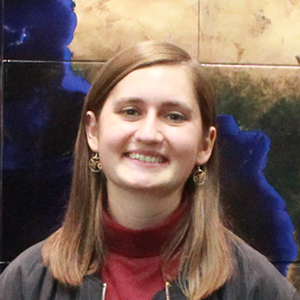Passion for Marine Science leads Young Researcher Abroad
Beth Hoots knew she was interested in marine science since the age of 12. Born and raised in Portland, Oregon, she grew up fishing in the ocean and volunteering at an aquarium, all while dreaming of working on a National Oceanic and Atmospheric Administration (NOAA) vessel.
"I think everyone has a marine biology phase at some point, but I just never grew out of mine,” Hoots said. “I have always been interested in environmental activism and climate change research, with fisheries as my main interest.”
As a recipient of the National Merit Scholarship, a full ride opportunity led Hoots to the University of Idaho in 2016. She said she has been fortunate to be supported and challenged by all the professors, faculty and peers in the program of Ecology Conservation and Biology.
During her undergraduate experience, Hoots is pursuing as many research opportunities as she can. She has completed a variety of research, including projects in Costa Rica, Ecuador and Willow Creek Reservoir in Oregon with the Army Corps of Engineers.
"Living in Ecuador, in particular, for three months during my freshman year gave me a taste of college-level research, specifically studying the biodiversity and ecology of a particular pond,” Hoots said.
She said her life-changing, inspiring experience in Ecuador prompted her to study abroad in Peru last semester, a place that made all her dreams come true. The ecological diversity of the Andes Mountains, Amazon Rainforest and desert coast made Peru the perfect place to live, Hoots said.
While in Peru, Hoots said she continued to work on her final thesis project under the mentorship of her thesis supervisor Frank Wilhelm, professor in the College of Natural Resources. She compiled her initial data collections of the effects of rising water temperature on the duration of the lifecycle of a caddisfly.
Now back at U of I for her second to last semester, Hoots continues to collect and bring the insects back from Lake Coeur D ‘Alene Lake for lab observation in water tanks at different temperatures.
"Not only did I work on my thesis, but I polished my Spanish-speaking, engaged with the friendliest people in such an authentic culture, and enjoyed delicious food throughout all of my adventures,” Hoots said.
She said taking advantage of Career Services has been the most helpful resource for utilizing opportunities that have led her to where she is now. Meeting consistently with Eric Anderson and Wendy Wagner gave Hoots the confidence to apply for anything, from research opportunities to jobs to scholarships, she said.
"It is always convenient to have a second pair of eyes read over everything and provide helpful, knowledgeable feedback,” Hoots said. “I am thankful for all of the professional help I have received on building and editing my resume, writing cover letters and letters of interest, filling out applications, and just having a friendly face to talk with."
Dr. Wilhelm said Hoots has completed original, independent research over the last year for her thesis. Other than weekly meetings, Wilhelm said he has gotten to know Hoots through eight hour field days and their travels to places such as Ecuador.
"Beth may seem shy at first if you don’t know her, but she is a firecracker,” Dr. Wilhelm said. “She has always been pleasant to interact with, especially because she is fiercely independent and acts more as a colleague than an undergrad."
Dr. Wilhelm said Hoots has an incredible skillset to aid her graduate school applications and has pursued everything out of genuine interest, rather than simply checking boxes before graduation. He said her pursuit of research, international experience and speaking another language, and more, has all prepared her well for her future.








